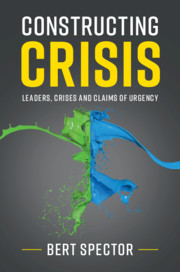Book contents
- Constructing Crisis
- Constructing Crisis
- Copyright page
- Dedication
- Contents
- Tables
- Preface
- 1 Undertaking a New Interpretive Effort
- 2 Crisis as a Reification of Urgency
- 3 Advancing the Crisis-as-Event Model
- 4 Problems, Crises, and Contextual Constructionism
- 5 An Objective Description and a Subjective Uh-Oh!
- 6 Believing Claims of Urgency – Or Not
- 7 The Power of a Good (Crisis) Narrative
- 8 To Create Such a Crisis, to Foster Such a Tension
- 9 Beyond Forged-in-Crisis Leadership
- 10 So What?
- References
- Index
4 - Problems, Crises, and Contextual Constructionism
Published online by Cambridge University Press: 23 August 2019
- Constructing Crisis
- Constructing Crisis
- Copyright page
- Dedication
- Contents
- Tables
- Preface
- 1 Undertaking a New Interpretive Effort
- 2 Crisis as a Reification of Urgency
- 3 Advancing the Crisis-as-Event Model
- 4 Problems, Crises, and Contextual Constructionism
- 5 An Objective Description and a Subjective Uh-Oh!
- 6 Believing Claims of Urgency – Or Not
- 7 The Power of a Good (Crisis) Narrative
- 8 To Create Such a Crisis, to Foster Such a Tension
- 9 Beyond Forged-in-Crisis Leadership
- 10 So What?
- References
- Index
Summary
The literature emerging from within the crisis-as-event model intends to be imminently practical and extremely useful. Based on the best available evidence and on an analysis of past approaches to crisis management, these experts tell us, here is what leaders should do and what they must avoid.
But while offering actionable advice, the crisis-as-event model underplays theory. To be sure, there is an underlying theory to the model: a positivist approach that holds that crises are real, material things and leaders respond in an effort to “own” that crisis to save/redeem/revitalize the threatened entity. So it isn’t that the crisis-as-event literature is atheoretical, exactly. It’s just that the theorizing is tacit rather than explicit, unspoken rather than acknowledged. That’s a problem.
- Type
- Chapter
- Information
- Constructing CrisisLeaders, Crises and Claims of Urgency, pp. 58 - 80Publisher: Cambridge University PressPrint publication year: 2019



